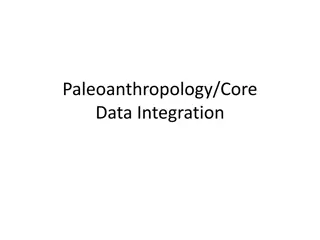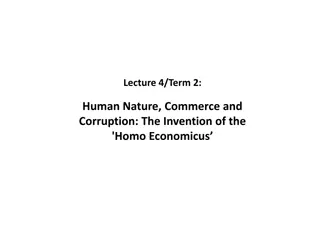Understanding Different Types of Fermentations
Alcoholic fermentation involves the production of ethanol, commonly carried out by yeasts like Saccharomyces cerevisiae. On the other hand, lactic acid fermentation results in the production of lactic acid through two types: homo-fermentative and heterofermentative pathways. Different substrates and
2 views • 23 slides
Evolutionary Journeys in Paleoanthropology: A Comprehensive Overview
Explore the diverse realms of paleoanthropology, from core data integration to correlations between terrestrial records and geochronology. Delve into the changes in A. afarensis morphology, early Homo responses, Homo erectus dispersals, and H. sapiens contexts. Discover the broader implications of a
0 views • 9 slides
Human Evolution: Out of Africa Hypothesis
The Out of Africa Hypothesis suggests that humans originated in Africa and then migrated to other parts of the world in two waves. The first migration occurred around 100,000 years ago, following the Nile River into the Middle East. The second migration, approximately 85,000 years ago, saw a group o
0 views • 59 slides
Evolution of Early Humans in Africa: A Journey Through Time
Explore the fascinating timeline of human evolution in Africa, from Australopithecines walking upright to the emergence of Homo habilis and Homo erectus. Discover how these early humans adapted, developed tools, and utilized fire, shaping the course of human history.
0 views • 20 slides
Understanding Human Evolution: Evidence of Common Ancestors
Explore evidence supporting the common ancestors for living hominids, including humans. Delve into phylogenetic trees, shared characteristics with African apes, and anatomical differences. Learn about the Hominidae family, genus Homo, and the terms "hominid" and "hominin.
0 views • 93 slides
The Evolution of Liberal Economic Thought: Friedrich Hayek and Adam Smith
The lecture delves into the concept of 'Homo Economicus' and the ideas of Friedrich Hayek and Adam Smith regarding individualism, liberalism, and economic freedom. It discusses how Hayek praised Smith's contribution to liberalism and the significance of securing individual freedom. The Acts of Union
0 views • 20 slides
Exploring Artificial Intelligence: From Human Autonomy to Technological Evolution
Delve into the realms of artificial intelligence and human evolution, contemplating the need for preserving autonomy and responsibility. Discover the intriguing journey from life and information transmittance to the unfinished evolution of Homo Sapiens, alongside the complexities of mind, intelligen
0 views • 12 slides
Understanding Parasitology in Veterinary Medicine by Prof. Dr. Suzan A. Al-azizz
Parasitology is a vital study of parasites and their hosts, encompassing various disciplines like cell biology, bioinformatics, genetics, and ecology. This field emphasizes the binomial system of species naming pioneered by Linnaeus. The essence of human scientific naming is exemplified by Homo sapi
0 views • 16 slides
Mechanisms Underlying Language Acquisition and Group Belonging
Will Forsyth's review explores how in-group affiliation behaviors facilitate speech acquisition through sociocultural, social-psychological, and social cognition approaches. Neural adaptations in Homo sapiens since Australopithecus, particularly in speech-related areas, are crucial for language evol
0 views • 8 slides
Exploring Tooley's Argument on Abortion and Infanticide
Tooley challenges the common argument against abortion by proposing that fetuses and infants do not meet the Self-Consciousness Requirement (SCR) to have a right to life. He distinguishes between human and person, emphasizing the moral implications. The key questions raised revolve around the proper
0 views • 26 slides
Capitalization Rules for Races, Nationalities, and Species
Learn how to properly capitalize races, nationalities, and species in your writing. Always capitalize races such as Chinese, Indian, and Hispanic. Capitalize nationalities and nation-related words like French, Swiss, and Spanish. When writing species names, capitalize the first part of the scientifi
0 views • 5 slides










